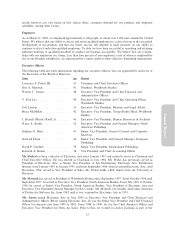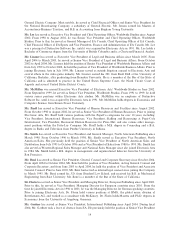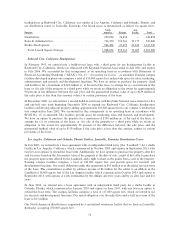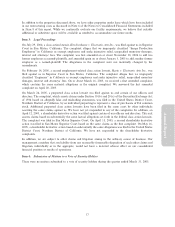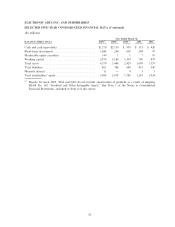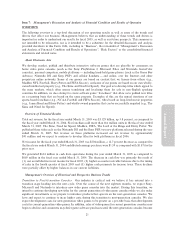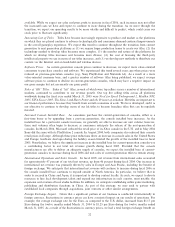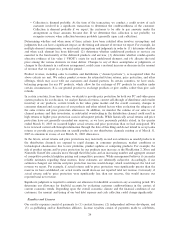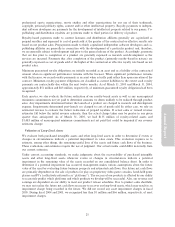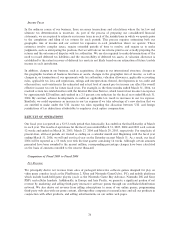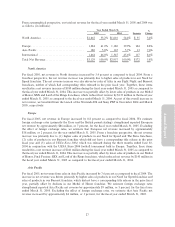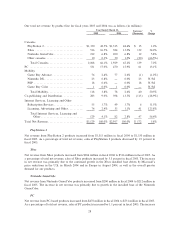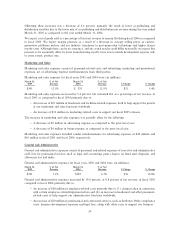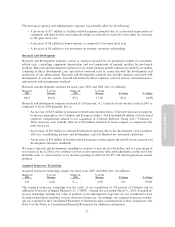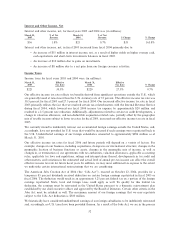Electronic Arts 2005 Annual Report Download - page 78
Download and view the complete annual report
Please find page 78 of the 2005 Electronic Arts annual report below. You can navigate through the pages in the report by either clicking on the pages listed below, or by using the keyword search tool below to find specific information within the annual report.available. While we expect our sales and gross proÑt to increase in Ñscal 2006, such increases may not oÅset
the increased costs we have and expect to continue to incur during the transition. As we move through the
transition, we expect our operating results to be more volatile and diÇcult to predict, which could cause our
stock price to Öuctuate signiÑcantly.
Increasing Cost of Titles. Titles have become increasingly expensive to produce and market as the platforms
on which they are played continue to advance technologically and consumers demand continual improvements
in the overall gameplay experience. We expect this trend to continue throughout the transition from current
generation to next generation platforms as (1) we require larger production teams to create our titles, (2) the
technology needed to develop titles becomes more complex, (3) the number and nature of the platforms for
which we develop titles increases and becomes more diverse, (4) the cost of licensing the third-party
intellectual property we use in many of our titles increases, and (5) we develop new methods to distribute our
content via the Internet and on hand-held and wireless devices.
Software Prices. As current-generation console prices continue to decrease, we expect more value-oriented
consumers to purchase consoles and software. We experienced this trend several years ago when prices were
reduced on previous-generation consoles (e.g., Sony PlayStation and Nintendo 64). As a result of a more
value-oriented consumer base, and a greater number of software titles being published, we expect average
software prices to continue to decline on current-generation consoles, which may have a negative impact on
our gross margin but not necessarily our gross proÑt.
Sales of ""Hit'' Titles. Sales of ""hit'' titles, several of which were top sellers across a number of international
markets, continued to contribute to our revenue growth. Our top Ñve selling titles across all platforms
worldwide during the Ñscal year ended March 31, 2005 were Need for Speed Underground 2, Madden NFL
2005, FIFA Soccer 2005, The Sims 2 and Harry Potter and the Prisoner of Azkaban. Hit titles are important to
our Ñnancial performance because they beneÑt from overall economies of scale. We have developed, and it is
our objective to continue to develop, many of our hit titles to become franchise titles that can be regularly
iterated.
Increased Console Installed Base. As consumers purchase the current-generation of consoles, either as a
Ñrst-time buyer or by upgrading from a previous generation, the console installed base increases. As the
installed base for a particular console increases, we generally are able to increase our unit volume; however,
these unit volumes often begin to decrease as consumers anticipate the release of the next-generation of
consoles. In March 2004, Microsoft reduced the retail price of its Xbox console in the U.S. and in May 2004
Sony did the same with its PlayStation 2 console. In August 2004, both companies also reduced their console
retail prices in Europe. Although these price reductions drove an increase in console sales in the United States
and Europe, hardware shortages during the holiday season limited the growth of the installed base in Ñscal
2005. Nonetheless, we believe the signiÑcant increase in the installed base for current-generation consoles was
a contributing factor to our total net revenue growth during Ñscal 2005. Provided that the console
manufacturers are able to deliver an adequate supply of consoles, we expect the installed base of current-
generation consoles to increase during Ñscal 2006 and unit sales of current-generation titles to remain strong.
International Operations and Sales Growth. In Ñscal 2005, net revenue from international sales accounted
for approximately 47 percent of our total net revenue, up from 46 percent during Ñscal 2004. Our increase in
international net revenue was primarily driven by sales in Europe and Asia PaciÑc, including the beneÑt of
foreign exchange. We anticipate that international net revenue will continue to increase during Ñscal 2006 as
the console installed base continues to expand outside of North America. In particular, we believe that in
order to succeed in China and Japan, it is important to develop content locally. As such, we expect to devote
resources to hire local development talent and expand our infrastructure in each country, most notably, the
expansion and creation of local studio facilities. In addition, we anticipate establishing online game marketing,
publishing and distribution functions in China. As part of this strategy, we may seek to partner with
established local companies through acquisitions, joint ventures or other similar arrangements.
Foreign Exchange Impact. Given that a signiÑcant portion of our business is conducted internationally in
foreign currency, Öuctuations in currency prices can have a material impact on our results of operations. For
example, the average exchange rate for the Euro, as compared to the U.S. dollar, increased from $1.17 per
Euro during the twelve months ended March 31, 2004 to $1.25 per Euro during the twelve months ended
March 31, 2005. As a result of the Öuctuations in currency prices, we had a total foreign exchange beneÑt on
22



